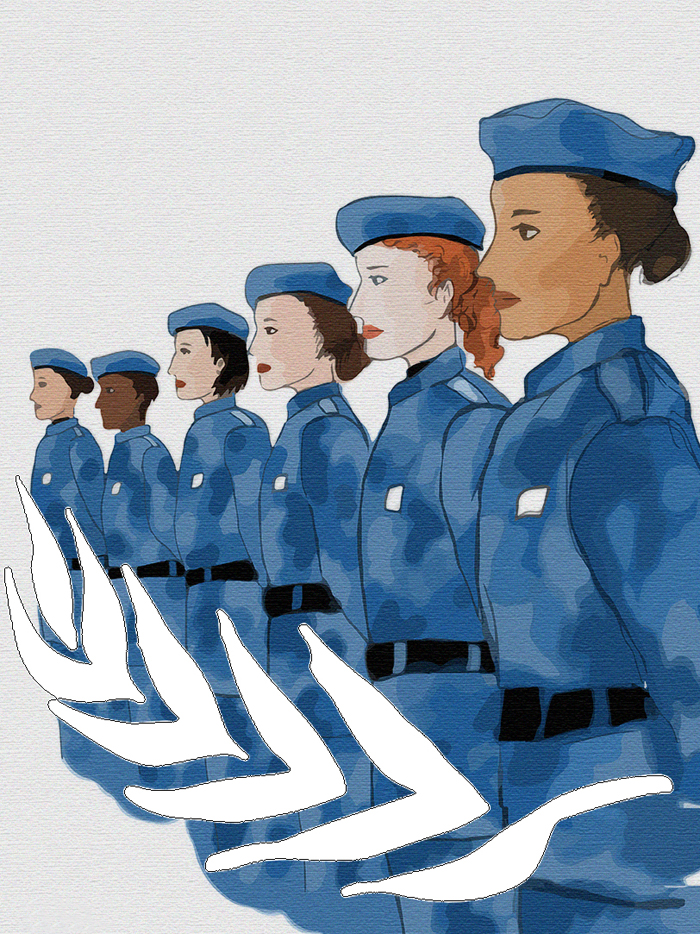The McGill chapter of Women in International Security (WIIS) held its first public event, “Women in Peacekeeping,” on Oct. 11, which called for increasing the participation of women in the United Nations’ (UN) peacekeeping forces. The talk was hosted by WIIS executive director, Cassandra Steer, who has worked with McGill both within the Faculty of Law and as the executive director of Institute of Air and Space Law. WIIS operates globally as a non-profit organization committed to supporting and advancing the interests of women in the field of international security.
The main objective of peacekeeping is to ensure the safety of civilians in countries involved in conflict by sending in soldiers from non-partisan countries. Steer began her talk by describing the violence that women often face in conflict-stricken countries. She cited Dr. Tia Palermo’s 2011 study which states that more than 400,000 local women were raped at the hands of both combatants and members of the occupying United Nations Peacekeeping Force in the Democratic Republic of the Congo in 2007.
Commenting on the statistics, Steer highlighted the impact of sexual violence in countries with armed conflicts.
“Armed conflict impacts women and men, but women and girls are targeted because of their gender in a very particular way,” Steer said. “When you attack a woman’s sexuality […] you take away her power, her identity, her ability to interact with society.”
Steer went on to explain that the stigma associated with sexual violence often discourages women and girls from reporting or disclosing their assault to authorities.
“Women and girls who have been attacked sexually don’t feel that they can report that atrocity because often they will be ostracized,” Steer said, “[The sentiment is that] they are no longer clean, they are dirty, it was their fault.”
Evidence from the National Center for Biotechnology Information suggests that women feel safer disclosing incidents of sexual violence to other women than they do men. Steer noted that there have been no documented incidents of women peacekeepers sexually assaulting locals. She believes that having women in leadership roles is a start to solving mass sexual violence, but called for a solution more nuanced than simply fulfilling gender quotas.
“There’s a risk that the perception is [that] if we deploy women, it’ll solve all our gendered problems,” Steer said. “Women are sometimes alone. They can be isolated, they can deal with sexism and violence, they can deal with sexual aggression from leaders within the peacekeeping force, […] and they may be expected to deal with every gendered issue.”
Lynne Gouliquer, an assistant professor in Sociology at Laurentian University, researches female employment in male-dominated fields. In an email to The McGill Tribune, Gouliquer emphasized the importance of diverse approaches to peacekeeping.
“The more diverse an organisation, the better able it will be [able to meet] its goals, objectives, and mission in a proper and ethical manner,” Gouliquer wrote. “[The Canadian military] does not represent the diversity present in Canada. The issues of gender and sexual minority discrimination and harassment that […] plague our military [are indications] that our military has issues to fix, in addition to attracting more women and increasing diversity.”
Students at the event noted the harsh reality of gendered violence perpetrated by peacekeeping forces. For Melissa Montana, co-founder of the McGill Chapter of WIIS, this event helped promote awareness of gender disparities in this realm and more widely across the globe.
“It is important for students to educate themselves more on the issue, so that they can better understand how these power dynamics work in society, and learn to rectify them through their day-to-day lives,” Montana wrote in an email to the Tribune. “Whether that be trying to host more diverse panel discussions on campus, or even thinking more broadly about how policies […] affect men and women in different ways.”







